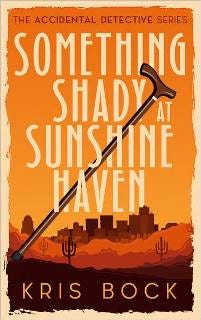Video Transcription: Hi, and welcome back to Write Better Right Now. I hope you had a good holiday season.
I was recovering from an appendectomy and COVID, so my plans were not quite what I expected, but I did get to catch up on some reading.
One of the books I read was the latest in a series that I really enjoyed, but this time I found myself rolling my eyes really hard at some of the character behaviors. I'm not going to name the book since I'm going to say some negative things about it, but a brief explanation:
It's set during the Prohibition era. The main male characters are both former soldiers. They have been set up as intelligent and capable. They have come to this place to look for friends of theirs, because they know there are some dangerous things going on in the world and they need to meet up and discuss it, but they can't find their friends. They do get a telegram, though, that is supposedly from one of the friends that says, “Meet us tomorrow night, midnight at this location.” And they think, “How frustrating, why didn't she leave a letter explaining what's going on instead of this vague telegram?”
The reason is obvious, that it is a trap. The bad guys sent the telegram, not wanting to send a letter where you might recognize handwriting. It seemed really unrealistic that these men would not suspect that it could be a trap. Then they go to the meeting in a speakeasy. They're waiting, looking around, having drinks, and one of them takes a drink and thinks it tastes funny.
So what does he do? He keeps drinking it.
Do not drink the funny tasting drink when you may have walked into a trap.
This book got me thinking about how you need your characters to behave believably, but sometimes you want them to do certain things for plot reasons. You have to make that believable.
What are some ways you can do that?
One is to set up character traits as somebody who would do the things you need them to do.
In the Accidental Detective series, my main character has been a war correspondent for 30 years.
Obviously, to go into that field, she has a certain amount of innate courage. She has also now had 30 years of reporting in war zones. She's going to have a much higher bar than the average person for what is dangerous. She also has a thirst for finding out the truth, so she can clearly see things that are dangerous and still move forward, because that's the kind of person she is.
So if you need your character to do foolish things, you can make them brave or foolish, reckless, or so naïve that they don't recognize danger. You could give your character a temper so that when something sets them off and they get really angry, they do things that they might not have done if they were in a calmer moment.
If you know your characters are going to have to do some of these (dangerous) things, make them the kind of people who would do them.
You can also use things that have happened recently, or use their current mental state. In Whispers in the Dark, the main character had been attacked before the book started and suffered PTSD from that attack.
When she walks into a dangerous situation again, she panics and she starts running, even though it's dark and she knows that there is a cliff somewhere in the area. She can't control herself. She is overwhelmed by her panic and behaves in a way that is not logical because she doesn't have access to logic right then.
Somebody who is suffering from a lot of anxiety is maybe going to overreact very quickly, whereas somebody who is in a deep depression may not react at all for much longer than the average person.
You can have past experiences or assumptions about the situation. Think of a horror movie where they're freaked out by a noise, and then it's just a cat. If that happens two or three times,
then it makes sense that the next time they hear a strange noise, they're going to think, “Oh,
it's just the cat,” and they're not going to be as cautious.
So you can set it up logically that the character is going to behave in a way that maybe would not be normal for an average person.
You can also give your character a very strong motivation to do whatever it is you need them to do. Of course, you want them to have a strong motivation in any case.
In my new Reluctant Psychic series launching in the spring, the main character is a more cautious type, so she would not normally get herself involved in other people's problems, let alone a murder.
But on her first day at a new job in this quirky small town New Mexico museum, she picks up a mineral sample and she gets this vision of it being used as a weapon. She wonders if her predecessor really died in a car accident, as she's been told, or if he was murdered and it was made to look like a car accident. If it was murder, was it something that happened on the job? Could there be something about the job that would put her in danger? She stepped into his life, took his job, moved into his former house, so she can't feel safe until she figures out what really happened.
Give your character:
a strong need to know,
a need to help or rescue someone else,
or a need to reach a goal,
and that motivation overpowers the logic that might say, “You shouldn't do this.”
You can also use other characters to manipulate your main character. In What We Found, the main character is 22, just out of college, starting her first job. She goes for a walk in the woods with a boy that she had a crush on in high school, and they find a dead body. Her immediate instinct is, “We need to call the police.” And he says, “No, we're not going to do that. You're not allowed to do that.” He drags her out of there and tells her to keep it quiet.
She thinks that's wrong. She assumes that he doesn't want anybody to know that he was smoking pot on their walk. This was written before pot was legal in New Mexico. So she finds a way to eventually pretend that she is finding the body for the first time and notifying the police without involving him. she is young and naive, she has been pushed into this by him. He's also the son of her new boss. She's afraid that if she gets the son in trouble, she could lose her job.
I hoped that I was showing why this particular character would have at least temporarily behaved against her instincts. Even so, one reader review said the book was problematic because when you find a body, “Obviously you call the police. It's just what you do.” In fact, this book was inspired by the real experience with friends of finding the body of a murder victim. We did immediately notify the police, but we found out later that actually quite often people do not.
That got me thinking, What are the reasons somebody might not notify the police if they found a crime scene? So the truth is that this is a fairly realistic situation, but I couldn't convince that one reader. You may not be able to convince every reader every time, but you can work to make sure that most readers will at least see why the character behaved in a certain way, even if they believe that they would not have behaved that way.
Back to the book that I was talking about. What could that author have done differently?
Well, as far as the telegram pretending to be from a friend, the simple answer is that they should have said “This could be a trap.” They are supposed to be intelligent. They suspect something is wrong. It would just make sense for them to identify this as a possible trap. They're still going to go to that meeting, because they don't know what else to do to try to find their friends. If it's a trap, they're going to walk into it and hope that they can get out of it.
That would have been more logical, and it also would have actually provided more drama for the story. I'm going to do another video going into detail on suspense versus surprise. But in general, if your reader and your characters know that something is probably wrong and they're waiting to find out just how bad it is, that's going to be more dramatic than if they are thinking everything is fine and they're surprised by something bad.
So go ahead and have your characters recognize the potential for danger and let them and your readers worry about it happening.
As far as drinking something that tastes funny, I really can see no way to have a character logically do that in the situation. The easy answer would be Don't have it taste funny. If somebody is trying to drug or poison another character, they're not going to want to leave any clues. It makes sense that the drink would taste normal. And that's really the only reason for this character to continue drinking it.
So in that case, it was like the author dropped a clue for the reader, but didn't want the character to recognize it. I just don't see why that would be better. If the reader doesn't recognize the clue, then there's no point in it. And if the reader does recognize it, but the character doesn't, then the character looks foolish. And this was not a foolish character. Better to keep it as more of a surprise.
Exercises:
Think about your work in progress. What is the most dangerous or foolish thing that you have your main character doing?
Did you provide good enough reasons for them to do it?
If not, are there ways that you can tweak their character or the situation to make it more
logical that they would do this thing?
If you don't have a work in progress or if you just want another exercise, you can also simply brainstorm reasons a character might do something dangerous or foolish. See if you can come up with a big list of personality traits or situations that would cause characters to behave in ways that most people probably would not.
Who knows, you might even inspire a new story idea.
That's it for me right now. I hope that next week I'll be able to get back to a regular weekly hosting schedule and get back to digging into strong plotting techniques more.
Thanks for being here with me. Here’s hoping for a wonderful new year ahead!
















Share this post